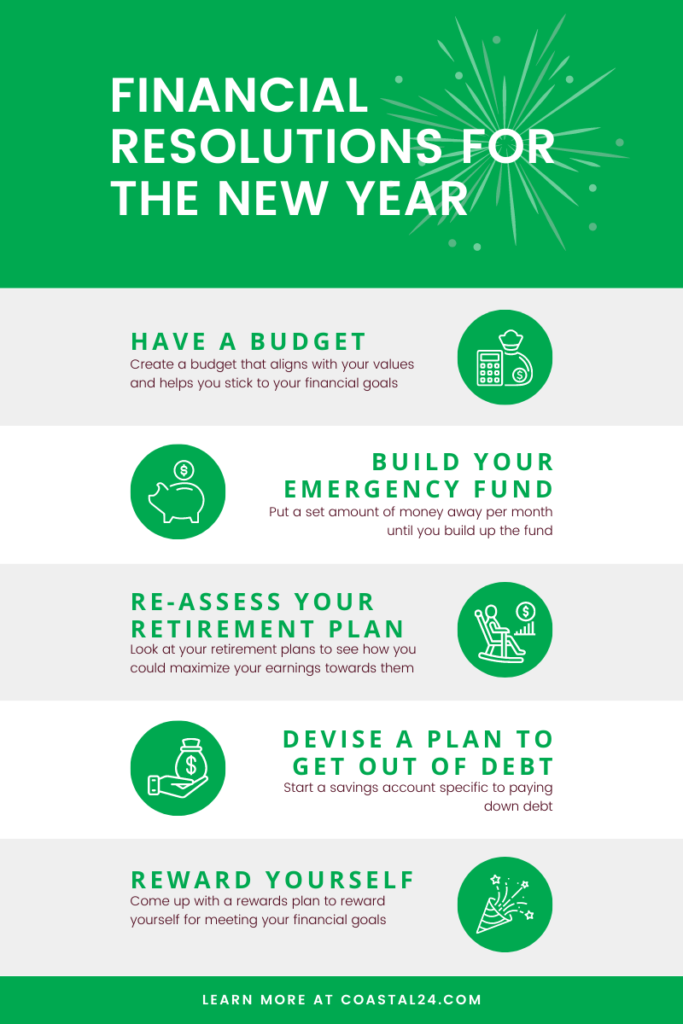The beginning of every new year is a new start for many. People always want to open up a new page and have a better year than they did previously. It gives us the excitement of achieving new things and having a better life, whether in our personal finance or something else. Because of this feeling of a new start, many people make New Year’s resolutions and goals.
One of the things that are extremely important is how you plan for the next year financially. This includes everything from your income to how much you spend and your big purchases. However, planning for these new year resolutions and goals is definitely not easy. There are many levels to it if you actually want to achieve them.

This requires efficient and deep planning. Efficient planning makes it easier to follow through because where many people fail is to execute the new year plans. I will talk about how you should financially plan for your new year’s resolutions & goals and what are the most efficient ways of achieving them. Don’t let this new year be one of those years of failed plans.
Why Should You Even Bother Planning for New Year’s?
It’s that time of the year again. The days are getting colder, the holiday spirit is in the air, and people are starting to prepare for the new year. For many, the new year is a time for reflection and self-improvement, which is why it’s a popular time to make resolutions and plan for the next year. You can make new year’s financial resolutions and goals for anything you want:
- If you want to increase your income,
- Whether you have plans on a big purchase like a house,
- Live your life better and get more experiences along the way.
You might have had a bad year or a good one. It doesn’t matter. All people want and need is a better year than before, so they plan for that. They also aim to take one more step in achieving their long-term goals. That’s why it’s important to plan for the new year.
Especially regarding your finances, you need to have a thorough plan and stick to it by a big margin. This allows you to get to the level you want and have a better life for the future. However, the majority of people don’t stick to their resolutions and fail to achieve their goals.

It may seem like planning for resolutions and goals never works, but it could if you do it right. The key to success is making your resolutions specific and achievable. You should also set achievable deadlines so you can track your progress and celebrate milestones along the way.
How Do You Set Financial Goals for the New Year?
Like everybody else, you are now on the path to creating your financial planning for the new year. That’s amazing that you even started, but how are you going to do it efficiently? The step to start and effectively create a plan is where many people fail. You first have to think of your goal.
- What do you want to achieve in the next year and the long term?
- What’s your current financial situation?
- What are the things you need to do?
- What do you want to do?
- Are there any things you’ve been putting off?
Finding the answer to these questions is the journey’s most important and hardest part. If you fail to understand yourself, there is no way you can come up with an efficient and achievable plan. Consider your long-term goals, your past years and what you are capable of doing.
It’s very easy to go above and beyond when thinking about all this but don’t. Be realistic and always be optimistic. If you plan things that are not achievable, you are never going to achieve them and stop pursuing them very early. Take it slow and really think of the most basic things.
Important Steps in Financial Planning for New Year’s
When you have the idea behind why you want to plan for the new year and how you should start thinking of those plans, it’s now time to create your plan. It might seem like it is easy to put everything together, but it’s actually a bit complicated. They must be purposefully categorized and set in a direction for you to follow easily.

It is also important to weigh in on your current situation and see what you can achieve with realistic goals. If you plan too much, that’s not bad, but it might demoralize you when you can’t achieve any of your goals. This mostly depends on your personality type, so you must know yourself very well beforehand.
Evaluation
Evaluation is the part where most people don’t know what to do. It’s an important step, and you must be very sure of your evaluation so that you can take yourself one step further. What I propose and find useful is to grade yourself in certain parts of life. Health, fitness, career, finances, etc. Let’s look at finances and how you should evaluate your current financial journey.
The first step is to create a scale of one to ten. Take a look at your current financial situation. Do you like where you are and if so, how much do you like it on a scale of ten – ten being the highest. For example, let’s say I have $100,000 in my bank account and $250,000 in my stock account and no real estate.
However, I would like to have at least $1M in my stocks and $500,000 in my checking in the far future and also potentially own real estate. This means I am far away from achieving what I want. At this point, I would rate my financial situation as 4. You now have a clear picture of your current situation, and in the meantime, you realize your end goal.
Realistically, think how much you can save and increase that number next year. Do you want to make it 5? or 6? What would qualify your financial situation as a 6? Know this, and then you can start your planning.
What are 3 examples of a financial goal?
Financial goals could come in various shapes and styles. They are highly personal and depend on where you are in life and what are your end goals. Some only plan to buy a luxurious car, and that’s their end goal, but some plan to build a real estate empire. When listing down your goals, you have to look for long-term goals, not short-term ones.
When you have your end goal in mind, you can set that goal into pieces and spread it over the years for your plan. Here are three examples of a financial goal:
- Building your stock dividend portfolio to a livable income,
- Buying real estate to cover your living expenses through rent,
- Reach a net worth of $10M.
The sky is the limit with the financial goals. It depends on what you want to achieve. However, it’s always good to plan something way above your pay grade so that you can find motivation in that.
Create a plan
Once you know yourself, your current situation and what you want to achieve, you can create your plan. But this plan shouldn’t be like writing down the things you want to achieve. You can approach this in two different methods:
- Create milestones along the way to celebrate little things
- Shoot for the moon and see how far you’ve become
Two of these things appeal to two different personalities. If you demoralize quickly, always go for the first one and have little goals in between o the path to your big goal. If you find your morale in trying to achieve the unachievable, go for the second one. One type can’t go for something unsuitable. You have to know the type of person you are.

Looking at the example above, if you are the second type of person, you can say that you will hit $1M in your stock account in the next year. That might not be realistic, but if this motivates you, plan that. Think how much you need to save/invest to reach $1M in the next year. This might give you some new ideas to earn more and invest more.
However, if you are the first type of person, you can say that you are going to reach $375,000 in your stock account next year, which is more realistic. You can create little milestones like reaching $275,000 in a stock account in the first two months and celebrate that as you reach it.
What Are 5 Healthy Financial Habits?
After you set your goals, keeping up with them is the real challenge, no matter how well you plan for new year’s. Temptations will always be there, and also, life happens. You never know what will happen and what you will have to spend your money on. That’s why it’s good to keep financial habits that will make sure to give you a good picture of your finances and help you achieve your goals.
Review your financial plan and situation
Always track your financial situation, spending, assets, investments, and cash. Make sure you have a full picture of everything and that you can go check it out easily to see your situation. Make it a habit to review your financial situation every week or every month.
See where you are with achieving your goals and change up your plans a little if necessary. You might be behind, or you might be ahead of your plans. All is good, but it’s good to be ahead. Don’t review your situation to stress over your current situation. Review it to see which areas you can improve on.
Set goals as you go
You might have set goals at the beginning of the year, and they might be working perfectly well for you. That’s all good, but this doesn’t mean that you should stick with a goal you set once. There could always be revisions, new ideas, and new things to do in your finances that you think will fit better.
Don’t be afraid to set new goals or make revisions to your current goals. However, never downgrade your goals. Always try to improve on them. It’s fine if you can’t reach your goal at the end of the year. The important thing is how much you managed to achieve.
Create and stick with your budget
Along with creating a new year’s plan for yourself, also create a budget for yourself. This means you should have a budget as to how much you want to spend each month. Don’t go over this budget, and always stick with it unless something unexpected happens.
If you finish your budget by the end of the month, act like you are broke or try to find new ways for income. That would give you good financial discipline and ensure you are sticking with your plans.
Always look to increase your income
A table with four legs is much stronger than a table with only one leg. If you cut one leg, the table with one leg will break down in a second. However, the table with four legs will shake a little but still stand. Your finance is also like this. Don’t rely on just one income. Always be on the lookout to increase your income.
This could be through side hustles, extra jobs or by trying to get a promotion with a higher salary in your career. As long as your income increases, you won’t be affected by the daily chaos of inflation, the stock market, and other financial indicators.
Find passive income sources
When you are earning money, you are renting your time. Renting your time is okay when you are in your 20s and young and have a bunch of them. But the older you get, the more expensive that time will get. That’s why you should slowly stop renting your time to earn money.
Instead, your money should work for you through passive income sources. There are a bunch of them that you can do, but almost all of them require you to put effort into it in the first stage. Dividend investing, eCommerce, and royalties are just some examples.
Conclusion
It is important to know what you want out of life and how much money you need in order to make it happen. When you know what you want out of life, creating a financial plan for the new year becomes easier. There are many things to look for, and you have to plan solid if you want to achieve them.




